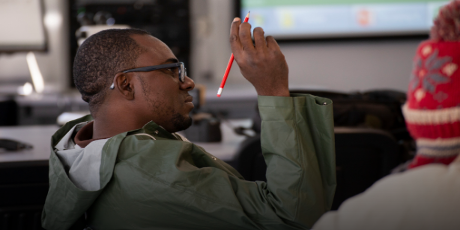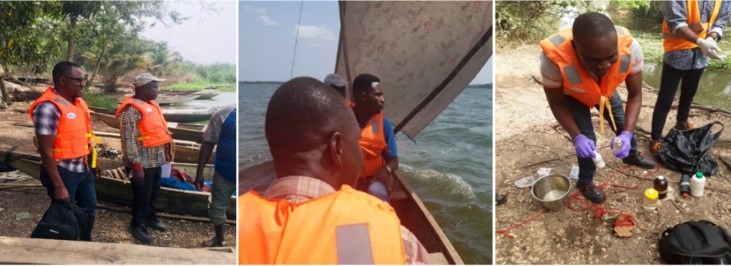Close-up: UN GEMS Water CDC MSc student Jeremiah Asumbere’s research into freshwater quality in Accra, Ghana. 22 May 2020

Through its global scoping exercise and bilateral discussions with the water and education sectors in developing countries the UN GEMS Water Capacity Development Centre, based in the ERI, identified a need for a flexible, advanced course for individuals involved in water quality management throughout the world. In addition, the new UN Agenda 2030 Sustainable Development Goal for water (SDG 6) is leading to an increased demand for knowledge, understanding and capacity in water quality monitoring and assessment worldwide. In conjunction with the UCC School of BEES, the Postgraduate Diploma in Freshwater Quality Monitoring and Assessment addresses these needs by enabling the development of expertise in countries through online learning.
The first run of Postgraduate diploma in freshwater quality monitoring and assessment, 2017-2019 led some of the graduates to continue their studies and enter a final year to obtain an MSc. In Freshwater Quality Monitoring and Assessment. The MSc comprises the same on-line modules as the Postgraduate Diploma but adds another year in which students undertake a research project and submit a dissertation. Students can carry out the research on a part-time basis over 12 months in their work place or independently in their own country. Thirteen students are currently carrying out research projects in their home countries on a wide range of projects.
To give a flavour of these topics, UCC School of BEES took a closer look at the ongoing research of MSc student, Jeremiah Asumbere, in Ghana.
Jeremiah’s project focuses on both environmental and public health protection in Accra, Ghana. His research aims to shed light on the pollution present in the Densu river basin and especially in the Weija reservoir.

Location of the Weija Reservoir in Accra, Ghana
Sampling in the Weija Reservoir, Accra, Ghana
The Densu river system is one of the largest contributors to surface water reserves in Ghana but it is considered to be polluted. The Densu river supplies the Weija reservoir. Similar to many river systems across the globe, the Densu catchment is exposed to pollution from a variety of different land uses including agriculture and industries like mining. Agricultural run-off in the rainy season can input excessive nutrients and pesticides to freshwater in the catchment, which is eventually carried through the river course and into the water bodies like the Weija reservoir.
The Weija reservoir is used for drinking water supply by the Ghana Water Company among other uses. There have not been any recent studies at the Weija reservoir despite its importance for supplying drinking water and the escalating threat of pollution.
Jeremiah’s project involves assessment of the potential threats to the water quality and the testing of water to provide further information on the impacts to water quality. His analyses include methods to detect and measure pesticides and heavy metals of concern along with commonly monitored physical and chemical parameters. The results of these sampling campaigns will help determine whether the water quality is deteriorating and the potential human health and environmental risks. The information obtained on the water quality and potential pollution threats is beneficial for all who value and use the water body.
Jeremiah’s project is expected to provide valuable conclusions to the Accra region, the Ghana Water Company and the Ghana Environmental Protection Agency.
Jeremiah has already carried out a number of field campaigns and laboratory analysis.
As a result of the COVID-19 pandemic, he and his fellow students are using the opportunity to carry-out desk-based research and analyse their data.

Sampling for water quality parameters in the Weija Reservoir and at the banks of the River Densu, Accra, Ghana.